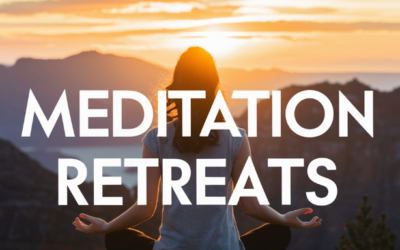Do you know how to meditate?
Meditation has proven to be effective for well being. The celebrities do it, so do the business moguls. Maybe you've thought about doing it but never really knew how to meditate?
Or perhaps you weren't sure if you were meditating properly?
In this post you will learn how to meditate so you can get the benefits of this ancient practice. We'll also share where to meditate, what you should do with your body, what you should do with your mind and how long you should meditate for to start reaping some of its benefits.
Where Should I Meditate?
- sitting in a chair
- sitting on the floor
- laying in bed. It's best to avoid meditating in bed because you tend to fall asleep.
When meditating you want to keep still and that means no restless legs, fidgeting feet or hand wringing. To help keep still, criss cross your feet on top of each other like a pretzel, have your arms resting at your sides, and have your hands rest on top of each other to form a cup shape, your thumbs can touch or not, it's up to you.
What's important is that your arms feel relaxed, your back is straight and your head is completely level. Your head is not tilted upwards or downwards just forward.
With your eyes, you have an option of meditating with your eyes open or with your eyes closed. For most beginners, meditate with your eyes closed as it's easier to focus than with your eyes open. Do not focus your eyes on an object in front of you, instead look into the distance.
How Long Should I Meditate For?
Most people recommend meditating between 10 to 20 minutes but you don't have to begin with that length of time when first starting.
What to Do During Meditation.
There are many different forms of meditation. Some focus on things around you, some involve reciting words in your mind. The one you'll be learning today is one of the most commonly taught forms of meditation and it's called mindfulness breathing meditation.
It's easy to learn and just as powerful and insightful as any other form of meditation.
The focus of breathing meditation is on your breath first.
You want to make sure that you're breathing through your nose. Then all you have to do is focus all of your attention on your breath. Observe the way the air feels as it flows through your nostrils. Observe the way your breath transitions from inhale to exhale. Observe that little pause between those two actions. Observe every single aspect about the way it feels, Do not judge it. Do not criticize it.
Simply observe.
What you'll quickly notice is that thoughts will start appearing in your mind and will distract you from this simple simple task.
It's typical to have thoughts bubble up such as 'What should I cook for dinner hmm... maybe I should order takeout instead, wait I'm trying to lose weight so I shouldn't or should I?'
When you notice your mind wandering, guide the focus back to the breath.
This is how you train your mindfulness muscle.
That's all there is to it.
Think of this as your mindfulness muscle getting stronger and stronger.

How Often Should I Meditate to Get the Benefits of Meditation?
When Will I Start Getting the Benefits of Meditation?
It would depend on the length of each session and the type of meditation. Ultimately it's hard to say because it really does differ from person to person. Certain people are less mindful in general due to the way they were brought up so it'll take them longer to start seeing the benefits. And it depends what is meant by benefits. If having greater emotional equanimity is a benefit, then with daily practice, it would be about 4-6 weeks to experience changes. If you would like to add greater potency to your meditations, try doing some visualizations for some meditation manifesting!
To give your meditation some extra benefit, you might want to also include some visualizations on how you would like your life to be.
Try meditation for manifestation to increase the potency of your meditation practice!
Career Opportunities for People with Mild Autism: A Comprehensive Guide
Autism Spectrum...
How the Oura Ring Revolutionizes Sleep Tracking Compared to Other Fitness Trackers
In the ever-evolving...
A 15-Minute Hypnosis Script for Adults with Mild Autism: Cultivating Calm and Connection
Many adults on the...
How CREB is Compared to a Mayor’s Office.
Imagine the brain as...
How PTSD Was Cured Four Times in 5 Hours
This case study...
Everything You Need to About Short Term Memory But Forgot to Ask
Short-term memory...
Trading Psychology and How to Improve Yours
Trading psychology...
Why You Should Go On A Meditation Retreat
Finding moments of...
100 Best Audiobooks on Behavioral Economics, Psychology, Meditation, Self-improvement
100 top non-fiction...







